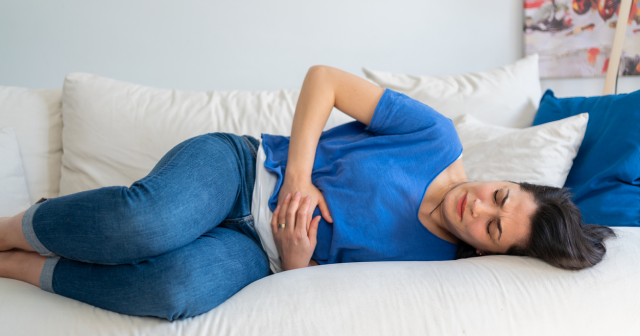Signs of menopause that might surprise you
The menopause – when you stop having periods – can cause various symptoms. Hot flushes and night sweats are 2 of the most common, but there are also several less well-known signs of the menopause.
Read on to find out about the the more unusual signs and symptoms of the menopause, and how you can deal with them.
What are the unusual signs of menopause?
Changing hormone levels during the perimenopause and menopause can affect different areas of your body, including your brain, gut, muscles and joints. This is why menopause symptoms can be so different and wide-ranging, explains Dr Aleem Qureshi, Healthily Clinical Lead and London doctor.
“Apart from the more well-known symptoms such as hot flushes, night sweats and ‘brain fog’, you may also get anxiety, cold flushes and formication – which is a sensation of insects crawling under your skin – as well as joint pain, a burning mouth, feelings of anger, bloating and heart palpitations,” says Dr Qureshi.
Fortunately, symptoms of the menopause can be treated and managed using medicines and self-care. However, some symptoms may cause more pain and discomfort than others – a doctor will be able to give you advice on your treatment options.
Here are 9 of the more unusual symptoms you may experience during perimenopause and after the menopause (postmenopause).
1. Menopause cold flushes
Cold flushes are when you feel a sudden chill. While they usually only last a few minutes, they can affect your sleep and leave you feeling tired in the morning.
Cold flushes are due to changing hormones, which affect your brain’s temperature regulator, the hypothalamus.Some women also have chills following a hot flush as the body tries to regulate its temperature.
So, what are the best ways to manage them?
- hormone replacement therapy (HRT) can help manage hot flush and cold flush symptoms by replacing your falling oestrogen levels.
- if you find your menopause chills come on after a hot flush, avoid alcohol, caffeine and spicy foods, as they can trigger hot flushes. Read more about how to stop hot flushes without HRT
- layering your bedding – this can cool you down if you’re having night sweats, or keep you warm if cold flushes are a problem. The same goes for clothing – choose loose layers in natural fabrics
2. Feelings of anger – perimenopause rage
Research has shown that irritability is the most common perimenopause symptom for up to 70% of women. But you may find you go beyond feeling irritated to suddenly feeling a lot of anger, bordering on rage. This is sometimes called ’perimenopause rage’.
These kinds of mood swings are a common symptom of menopause. This is because oestrogen plays an important part in the production of serotonin, often known as the 'happy hormone', which helps control your mood. As your oestrogen and serotonin levels decline, it becomes harder to manage your emotions.
It's important to be kind to yourself and recognise that your body is being affected by hormones you can’t control. Stress management, mindfulness meditation and other relaxation techniques can help manage your mood. Chatting to someone – a friend, partner or counsellor – can often help, too.
If you’re also having symptoms such as anxiety or depression, talk to a doctor. HRT can help with depression that develops in the menopause, while some people also benefit from antidepressants.
Read more about what can help with menopause mood swings.
3. Skin crawling during menopause – formication
The sensation of insects crawling under your skin – known as formication because of the Latin word for an ant being formica – can be unpleasant and annoying, and can cause you to itch and scratch.
It’s one of several skin conditions that can happen during the menopause, including itching day or night anywhere on your body.
As your oestrogen levels fall, so too do your levels of the skin-boosting protein collagen, which oestrogen usually stimulates.
This results in thinner, drier skin that's more prone to itching. You may also find you become more sensitive to soaps and detergents.
To stop the itching, use moisturisers and, if needed, ask a pharmacist for antihistamines. Skin problems can usually be self-managed, but see a doctor if they’re worrying you. They may be able to recommend other self-care remedies, or refer you to a dermatologist for more advice.
4. Hormonal hair loss and thinning
Losing hair can often be a concern during the menopause. Again, this is due to a drop in your oestrogen levels.
If your hair is falling out or becoming thinner due to the menopause, try using gentle shampoos and moisturising conditioners, and avoid using hot hairdryers.
Eating a healthy diet may also help if your hair starts to thin. In particular, having a low intake of iron, iodine, B vitamins or zinc has been associated with hair loss.
You should see a doctor if you’re worried about your hair loss during menopause. They may be able to prescribe medications to stimulate growth, and HRT may also help to manage it.
5. Tinnitus can be caused by hormonal changes
Tinnitus is commonly called ‘ringing in your ears’ – it’s when you hear noises that aren’t caused by sounds coming from the outside world. It’s common and not usually something to worry about. It can be triggered by the perimenopause or menopause, due to hormonal imbalances.
Self-care measures may help you cope with tinnitus, including:
- exercising regularly
- avoiding things that make tinnitus worse, such as stress or loud noises
- improving your sleep hygiene by trying things such as sticking to a routine
- relaxation techniques such as meditation, breathing exercises or yoga
Read about self-help techniques from the British Tinnitus Association (BTA).
If your tinnitus is affecting your sleep or concentration, or causing anxiety, see a doctor. Some evidence suggests that HRT may help with the management and prevention of tinnitus during menopause.
6. Problems with your mouth
Oestrogen plays a very important role in the creation of saliva. When your oestrogen levels start dropping, it can affect your mouth and dental health, and result in conditions such as dry mouth and burning mouth syndrome (BMS).
Dry mouth
It’s normal to have a dry mouth at times – due to dehydration or anxiety, for example – but if your mouth is persistently dry, it may mean you have dry mouth. Because your mouth isn’t producing enough spit (saliva), you may find it hard to eat, chew, speak or swallow.
Menopause is one of the causes of dry mouth, but other conditions can also cause it, including diabetes, Sjögren's syndrome and certain medications. So see a doctor if you’re battling with a long-term dry mouth.
If hormonal changes are to blame, simple self-care measures may help, including:
- drinking more fluids
- sucking on ice cubes
- sucking on sugar-free sweets or chewing sugar-free gum
- avoiding alcohol (including alcohol-based mouthwashes), caffeine and smoking
If self-care doesn’t work, a doctor may recommend products or medication that help your mouth to produce more saliva to relieve your dry mouth.
Read more about treatment for dry mouth.
A burning tongue or mouth
With BMS, your tongue, lips or entire mouth burns or tingles. You may also have a dry mouth, a bitter or metallic taste in your mouth, or lose your sense of taste. It may be mild or it can feel very sore, and you may get it every day or it may come and go.
Its exact cause isn’t known, but it’s linked to menopause’s hormonal imbalances and other conditions such as nerve damage, vitamin deficiencies or an oral yeast infection (thrush).
For self-care, try the same simple self-care tips used to treat dry mouth. Also, avoid acidic foods and drinks and make sure you maintain good dental hygiene. Taking steps to reduce your stress levels may help, too.
If you have ongoing burning or soreness in any areas of your mouth, see a doctor. To treat your symptoms, a doctor may recommend:
- ointments and medications to relieve pain
- products that help your mouth produce more saliva
- vitamin supplements if you have a vitamin deficiency
It’s thought that HRT may help relieve the symptoms of BMS too, but more research is needed to show how effective it is.
7. Tingling or numbness in your limbs
You may start getting ‘pins and needles’ in your hands or feet during menopause. Tingling or numbness – known as paresthesia – can affect any part of your body, although you’re most likely to get it in your hands, arms, legs and feet.
As your oestrogen levels go down during menopause, your central nervous system is affected, which, in turn, can cause tingling or numbness. These sensations may be unpleasant.
There are lots of other possible causes of tingling or numbness, including conditions such as diabetes. So it’s best to see a doctor if you’re getting it constantly, it keeps coming back, or you notice other unusual symptoms with it, including pain or suddenly finding it difficult to move.
To help relieve these sensations, try simple lifestyle changes, such as exercising regularly to help with circulation and relieve tension, and following a healthy, balanced diet, which can help prevent any vitamin deficiencies. Avoiding too much caffeine and alcohol and quitting smoking can help prevent certain causes of tingling, too.
Some people say that they get relief from tingling with acupuncture and massage. But no specific research has been done into how effective these therapies are.
8. Dry or itchy eyes
Are your eyes feeling dry, or maybe they’re burning or even feeling itchy? Dry eyes affect many people during menopause.
Falling hormone levels can affect glands in your eyelids that keep your eyes moist. The glands produce less fluid and oil, causing your eyes to become drier.
Self-care measures for dry eyes include keeping your eyes clean, resting your eyes regularly when working on a computer, and using a humidifier to stop the air getting dry. If you wear contact lenses, try wearing your glasses more often.
Treatments to help relieve dry eyes include lubricating eye drops and warm compresses. It’s best to see an optician if you’re concerned. Some conditions may need more specialist treatment from a doctor, such as oral antibiotics or steroid eye drops.
9. Brittle nails can be linked to menopause
During the menopause, you may find your fingernails become brittle and start to break more easily. Again, this is due to decreasing oestrogen levels in your body.
If you have brittle nails, it may help to:
- keep your hands out of cleaning liquids and detergents – for example, try wearing rubber gloves when you’re doing the washing up
- use a soft brush to keep your nails clean
- use moisturising hand cream
- keep your nails short, back to where they meet your skin – this can encourage them to grow back healthily
Having brittle nails isn’t usually something to worry about. However, see your doctor if you notice the skin around your nails becoming red, sore or swollen. These may be the early signs of an infection.
When to see a doctor about unusual menopause symptoms
You should call an ambulance or go to an emergency department if you:
- feel confused, drowsy or have trouble speaking
- have numbness or tingling that started suddenly and isn’t going away
- also have sudden weakness in your arms or legs, or your face droops on one side
- have loss of or blurred vision that starts suddenly
- feel numbness or tingling around your genitals, or have trouble controlling peeing or pooing
You should see a doctor as soon as you can if:
- you’re losing weight without meaning to
- you become clumsy or have trouble moving your hands, arms or legs
- you have numbness or tingling and also pain
Also see a doctor if:
- your unusual symptoms aren’t getting better with self-care measures, they keep coming back or they’re affecting your daily life
- you also have other symptoms you're not sure about
- your nails have changed in colour, shape or texture – this could be a sign of an infection or another condition
- you’re losing hair suddenly or unexpectedly, it falls out in clumps or you have bald patches, or your head burns or starts to itch
- you feel anxious or low in mood
- you have tinnitus in only one ear, or you also have deafness or dizziness
Your health questions answered
Can menopause make you feel weak and shaky?
Answered by: Healthily's medical teamYes, menopause can make you feel weak, shaky and dizzy at times. This can result from various different symptoms that – either on their own or combined – can affect your health.
For example, night sweats can stop you from sleeping and leave you feeling tired and irritable.
Hot flushes, meanwhile, can make your face, neck or chest feel hot. This feeling can spread to the rest of your body, causing sweating and chest palpitations.
You might also experience mood swings or anxiety, which can sometimes leave you feeling shaky.
Key takeaways
- the menopause can cause lots of different symptoms
- lesser-known menopause symptoms include cold flushes, formication, hair loss and tinnitus
- most menopause symptoms can be treated at home or with prescribed medicines, including hormone replacement therapy (HRT)
- diet and exercise can help with some symptoms of menopause
- see a doctor if menopause symptoms are having an impact on your day-to-day life








